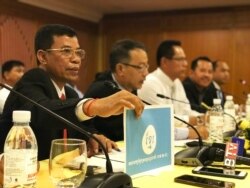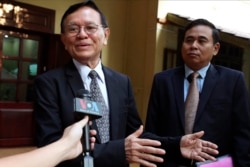With the stroke of a pen, King Norodom Sihamoni reinstated the political careers of seven former officials of the Cambodia National Rescue Party last weekend, matching the Supreme Court’s alacrity to disband the popular party in 2017.
Of the seven officials, two – former lawmaker Yem Ponhearith and Kem Sokha aide Muth Chantha – are being watched closely for their next move.
The political amnesty mechanism was installed by the government in 2019 to allow 118 former CNRP members who were banned from politics to request re-entry into the political arena. Political analysts, at the time, said the ad hoc procedure was another attempt by the ruling party to divide and conquer.
In the last two years, 22 former CNRP politicians have requested and been granted their constitutional right to participate in politics. It is unclear if that means another CNRP-linked party is in the making with 12 months to go for the commune election in June 2022.
These amnesties come as the Sam Rainsy faction of the party has been in exile and unable to return to the country. Former party president Kem Sokha is in legal limbo as his treason trial remains suspended with no indication of when it will resume.
For some, like the Cambodia Nation Love Party, it is justified for former CNRP members to ask for clemency so that there is an opposition entity on the ballots during the 2022 commune and 2023 general elections. The political bans are expected to end in November 2022.
“This brand-new party should exist in the face of declining opposition support against a strong ruling party as well as in the time of a deeply divided state of democrats,” the Cambodia National Love Party (CNLP) said in a statement this week.
The CNLP was created in early 2020 by Kang Kimhak and Chiv Cata, who received political amnesty in March 2019. The fledgling party’s attempts to reach out to the electorate and their public rallies have focused on the CNRP’s strongholds of Kampong Cham and Prey Veng.
“We urge all patriots, democrats, and former leaders and activists of the CNRP to join CNLP altogether for the sake of our motherland,” the same statement reads.
Other CNRP-linked entities have formed in the last three years, each attempting to take on the mantle of the primary opposition to the Cambodian People’s Party.
Political stalwart and former foreign minister Kong Koam joined a party started by his youngest son, Kong Monika, after getting amnesty. The Khmer Will Party was formed just before the 2018 national elections and received 3.3 percent of the popular vote, winning zero parliamentary seats.
Ou Chanrath, who was also pardoned in March 2019, confirmed months-long conjecture that he would start a political party by launching the Cambodia Reform Party in February. Chanrath was also a close ally of Kem Sokha.
Opposition activists speculate that former CNRP Deputy President Pol Ham might soon seek amnesty and consider joining Ou Chanrath’s party in May. Reached this week, Ou Chanrath neither confirmed nor denied whether Pol Ham would join his new party.
The Khmer Will Party, Cambodia National Love Party, and Cambodia Reform Party are all trying to project themselves as the presumptive successor to the CNRP, the new democratic party to take on the CPP.
Opposition activist Meach Sovannara, who is close to Kem Sokha, said the formation of a disjointed challenge to the ruling party would only result in a fractured mandate at the elections. He said the CPP was eager to approve more CNRP-linked parties, which would only help the ruling party repeat their sweep of the election in 2018.
The CPP currently occupies all elected seats in the Senate and National Assembly, and, after dissolving the CNRP, it has commune chiefs in all constituencies barring one.
"The opposition would be better off not seeking amnesty and standing firmly behind Sam Rainsy and Kem Sokha," said political commentator Em Sovannara.
“The influence and popularity of the CNRP remain virtually and spiritually bold among their supporters and people will see their political values remain intact as long as they keep resisting and are defiant against the ruling party,” Em Sovannara added.
The seven people pardoned last weekend were close aides of Kem Sokha, including Kem Sokha’s longtime chief of staff Muth Chantha, and former lawmakers Yem Ponhearith, Tout Khoeut, and Lat Litai.
The former opposition leader has attempted to distance himself from the recent developments. Kem Sokha’s lawyer, Chan Chen, made a thinly-veiled reference to Yem Ponhearith and Muth Chantha when he said they were trying to convince the former opposition leader into “realizing their ambitions” to contest elections.
“When Kem Sokha was not convinced… that handful of individuals accused him of being stubborn and eventually abandoned him,” Chan Chen wrote on Facebook last Saturday.
Sisowath Thomico, another banned politician who remains in close contact with Kem Sokha, told VOA Khmer that both Muth Chantha and Yem Ponhearith “decided together” to seek political amnesty and had distanced themselves from Kem Sokha “for the past few months.”
Former CNRP President Sam Rainsy, Yem Ponhearith and Muth Chantha did not respond to requests for comment from VOA Khmer.
However, Ou Chanrath said he was already in talks with Yem Ponhearith.
“But they have not yet come up with any particular plan for the future on whether to immediately resume political activity or to wait,” he said.
Political commentator Em Sovannara said both Kem Sokha and Sam Rainsy’s continued defiance to concede before the ruling party makes them a still-potent threat to the government.
“As long as they keep their stance, they both can bank on this as a capital for their future political investments,” Em Sovannara.
Opposition activist Meach Sovannara said one option would be for the remaining banned politicians to wait until their bans expire in November 2022 and unite behind one political entity, endorsed by both Kem Sokha and Sam Rainsy, to contest the 2023 polls.
“That would be the last resort,” he said.











